For several years, Woodland Hills has partnered with Settled, an organization addressing chronic homelessness through tiny home communities called Sacred Settlements. Each Sacred Settlement includes “intentional neighbors” who choose to adapt their lives to live life alongside formerly homeless neighbors.
Kim and Jamal are intentional neighbors at Settled’s first Sacred Settlement at Mosaic Christian Community in St. Paul. We asked them to share their story of becoming intentional neighbors and what that looks like in practice.
What’s a bit of your background?
Jamal: I’m originally from Los Angeles and Kim is originally from Michigan, but we both moved to Minnesota in childhood. Kim was raised in a traditional two-parent household, with three siblings and a firm foundation in faith. I was not raised in a traditional household and came to faith later, with a lot of help and patience from my lovely wife.
After meeting at Pannekoeken Huis, where we both worked as servers, we settled in the city of Oakdale and raised our son, Andrew, there. In 2011 he graduated from the same high school as his mother. With an empty nest, we found hobbies like backpacking, bike touring and cross country skiing. We also found volunteer opportunities that allowed us to live out our faith while doing things we felt were purposeful and meaningful. This eventually led us to Settled.
How did you get connected with Settled?
Kim: I was watching a Woodland Hills sermon online, and they mentioned the vision of a tiny home community to help people out of chronic homelessness. I looked up more information on the Settled website which included a neighborhood meeting at Mosaic Church. We attended the meeting and knew immediately that we needed to be involved, but we didn’t know in what capacity.
Jamal: Kim was so excited. I remember her calling out to me that I had to come see this thing she had just found. We had been part of various ministries over the years. We would volunteer and think that it was good, but we would eventually begin thinking, “Can’t we do more? What if we had someone in our home? What if we could…” When I went to see what Kim was so excited about, we looked at each other and said, “This is more!” We realized the desire we had been attempting to express over the years was for this.
How did you become intentional neighbors?
Jamal: We were introduced to the idea of being intentional neighbors at the first meeting at Mosaic Church. We were excited about it and joked about moving in ourselves, but didn’t mean it. We began attending trainings, getting to know the people associated with Sacred Settlement Mosaic, and volunteering for anything Settled or Mosaic-related that we could. Our intention was to fill some role, likely advocate befriender, but we weren’t sure.
Then, as chance would have it, the couple that was slated to move into the community as intentional neighbors decided to bow out. Leadership from Settled and Mosaic met to fill the opening with someone from the list of interested people. They decided Kim and I would be the perfect candidates. The only problem was that we weren’t on the list of interested candidates. They invited us over to discuss “something.” Kim was a bit suspicious as the meeting only consisted of leadership from Settled and Mosaic, and us! Then they laid out what they were thinking and asked us to consider moving in.
Kim: The team prayed over us and I began to cry. I can’t really explain it other than I felt like I was being comforted by the Holy Spirit. As a “stayer,” change can be hard for me, but as we prayed and consulted with our family and close friends, after only one week, we both felt strongly that yes, we should move into the community. Looking back over the last several years we could see God’s hand in guiding the path that would allow for us to make this move.
What is an intentional neighbor?
Kim: My role as an intentional neighbor is just that: to be a good neighbor, to be present and to build authentic relationships with my neighbors.
Jamal: The Settled model includes many roles. There are people in leadership roles that set community rules, deal with concerns and lead in various ways. There are advocates that connect with our neighbors and assist with things like accessing benefits. As intentional neighbors, our role is simply to be present, inviting our neighbors to take part in our lives and taking part in theirs.
When did you move in?
Jamal: Construction on our tiny home began shortly after we agreed to join, although Settled and Mosaic were still in negotiations with Saint Paul and there was no guarantee that we would even be able to move in. It took a few miracles and lots of help from an amazing array of volunteers to complete our home and get approval from the city.
We received a call on October 12, 2022 informing us that one of our neighbors was in difficult circumstances and asking if we could move in the next day. We swept sawdust and tools out of the way, and had the workers who were finishing up our home help carry our mattress inside. Our bed, coffee maker and a couple of overnight bags are all we had that first night!
What is your home like?
Kim: We live in a beautiful 300 square foot tiny house that was built by volunteers. One of my requests was to have a dining room table that seats four so I could host friends for dinner. We use the communal area in the church for showering, laundry and most of our cooking.
Jamal: Overall, it’s a bit like living in a nice RV at a campground, with all the additional things we need provided at the church building. We’ve had to make adjustments, but those things aren’t burdensome and are secondary to taking part in the community.
What does community look like in a Sacred Settlement?
Kim: Community looks like each person getting to live life in a safe, beautiful space, surrounded by people that care about each other. A highlight of my youth was going to summer camp, and living here feels a bit like living at summer camp year-round. I know relationship building will take time—it’s a slow process to grow deep roots—but that’s my favorite part, spending time getting to know my neighbors.
Jamal: It looks a bit like The Shire, especially at night when the lights are on. There are eight people in six houses, including three intentional neighbors. Gathering in large groups is often uncomfortable for our neighbors, so even though we have events, community is primarily found in impromptu encounters, where you happen to be in the same place, or you make enough noise that people come to see what the ruckus is.
Our favorite parts are actually the troubles. Supporting a friend through a difficult time, even if it just involves listening, creates more intimacy than months of trouble-free time together.
What have you learned through being part of this Sacred Settlement?
Jamal: We’ve learned that when you attempt to give generosity and community, you end up receiving generosity and community. We’ve learned that things rarely go the way you expect, and that’s okay. We’ve learned that we had constructed all kinds of barriers to keep people away from us, and how to reject these. We’ve learned that being in a new situation challenges your marriage, and that overcoming challenges together draws you nearer. We’ve learned that when you are busy running after someone trying to bless them, God is busy running after you.
Kim: We’ve learned that great things can happen when a group of people cross denominational boundaries and pour a lot of love into helping others.
What would you want other people to know about Sacred Settlements?
Jamal: There are a few ideas that we commonly encounter when people hear what we are taking part in:
- “Will you be like a manager or something and fix them?” People aren’t “them,” and we can’t fix other people, can’t even fix ourselves. We just try to love our neighbors.
- “You can’t solve homelessness that way.” Must we do everything in order to do anything? Maybe there is more than one solution to the problem.
- “This is the government’s job.” These homes were built with donations from local churches; we can take part and do something now.
- “It’s so amazing what you are doing…” We are here because we took one small and reasonable step after another. We haven’t done anything special. You could do this, or something else that you are called to.
Kim: I believe Sacred Settlements are the solution to chronic homelessness and are worth getting involved in, and that requires many people getting involved. I’m really grateful for Mosaic Church for saying yes to having the first Sacred Settlement. They are a wonderful, hospitable, generous, loving community of people.
Jamal: We intended to be a blessing when we decided to move into this community, but we did not expect the blessings we have received. It’s funny now to look back at how we hesitated when we were first asked to consider living in this community.
We are encouraged by Kim and Jamal and their story of faith. If you’d like to learn more about Settled, check out their website here. And to read more stories of Woodland’s journey with Settled, click here.

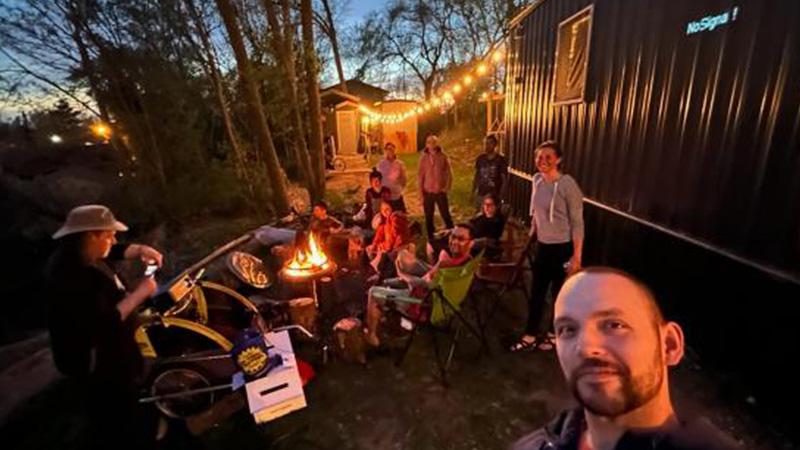
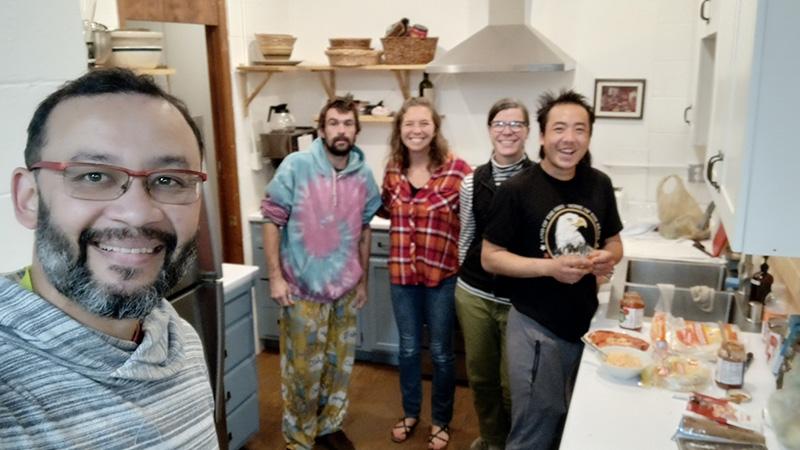
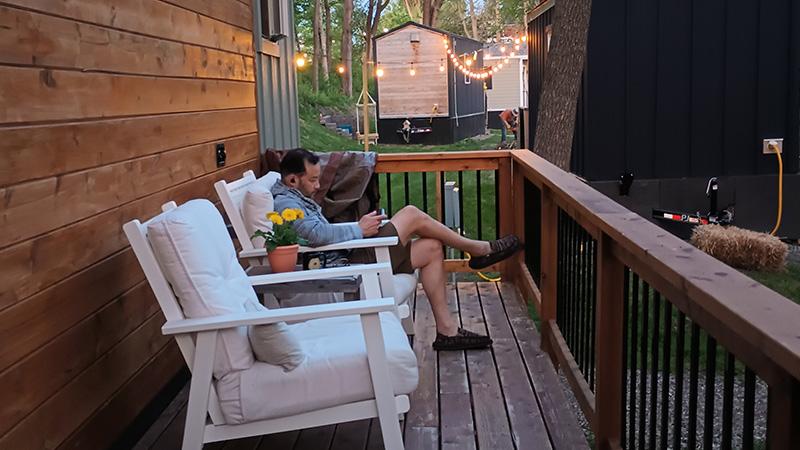
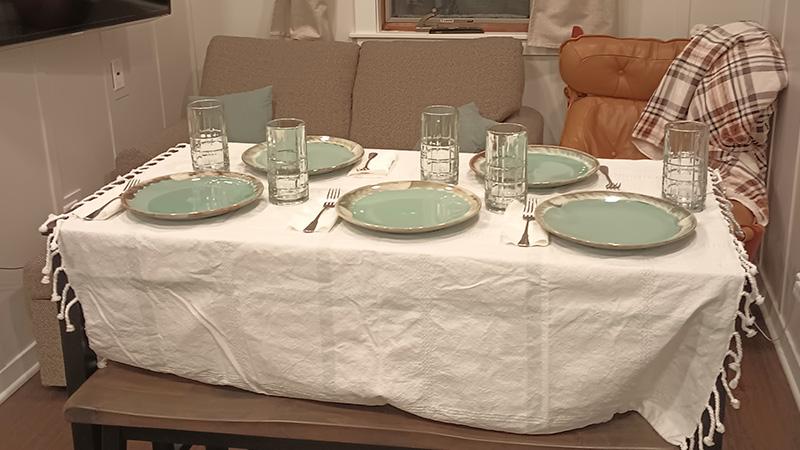
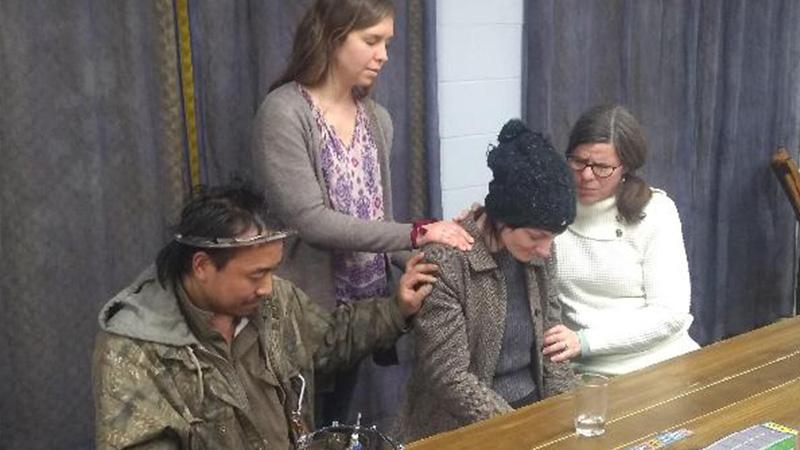
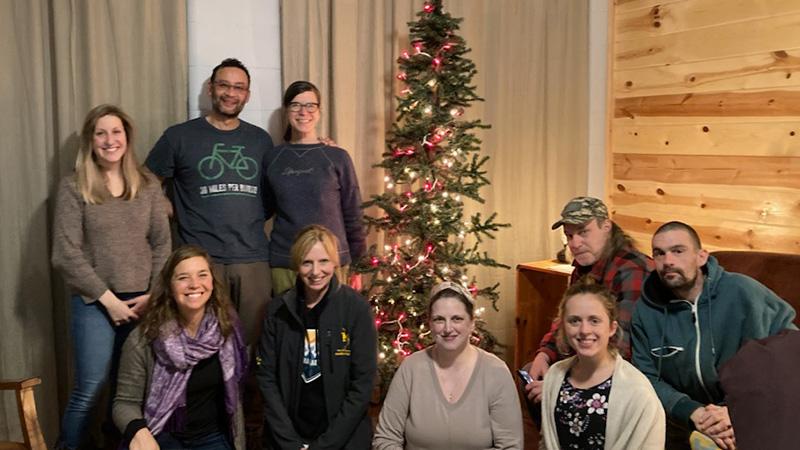


I believe I had lunch with Kim and Jamal, I remember it was lovely breaking bread with them and hearing their testimony. They are both two very special people. I thank God for them both and the entire Sacred Settlement. I am glad to be a part of a Church that has a heart for the needs in our community and around the world.
I love this ministry and model for dealing with homelessness. Our granddaughter and I had an encounter with a homeless person in downtown Chicagowhile we were visiting her. Later while discussing it in the car she was moved to tears. When she came to visit us in MN we took her to see the tiny homes on the WH property. She was so fascinated. Who knows what the vision of that settlement will stir in her someday?